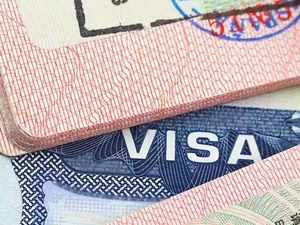 Agencies
AgenciesH-1B visas are used to bring high-skilled workers into the United States.
At present, international students can switch to a one year period of Optional Practical Training (OPT) after they graduate, but they eventually have to apply for an H-1B visa to continue working in the country.
The US issues 65,000 H-1B work permits each year, with a further 20,000 visas going to applicants with an advanced US degree.
(Join our ETNRI WhatsApp channel for all the latest updates)
Demand for these visas outstrips supply. Last year, the United States Citizenship and Immigration Services (USCIS) received 201,011 applications for the 85,000 visas on offer.
Indian nationals are the biggest beneficiaries of H-1B visas, accounting for over 70% of the new visas issued. In the last five years, a large number of these have gone to American technology companies and the share of Indian IT firms receiving H-1B visas have gradually declined.
The H-1B programme was initially designed for employers to address temporary labour shortages in speciality occupations. It has, however, now become the country’s primary highskilled immigration programme, the report pointed out.
It also suggested that the US would benefit by expanding its legal immigration avenues so that all international graduates — including advanced STEM degree holders with a job offer — have a chance to stay and contribute to the workforce and the US economy.
FWD.us is ‘focused on fixing the failed immigration and criminal justice systems’ and is backed by several people in the technology industry.









 Get Unlimited Access to The Economic Times
Get Unlimited Access to The Economic Times
